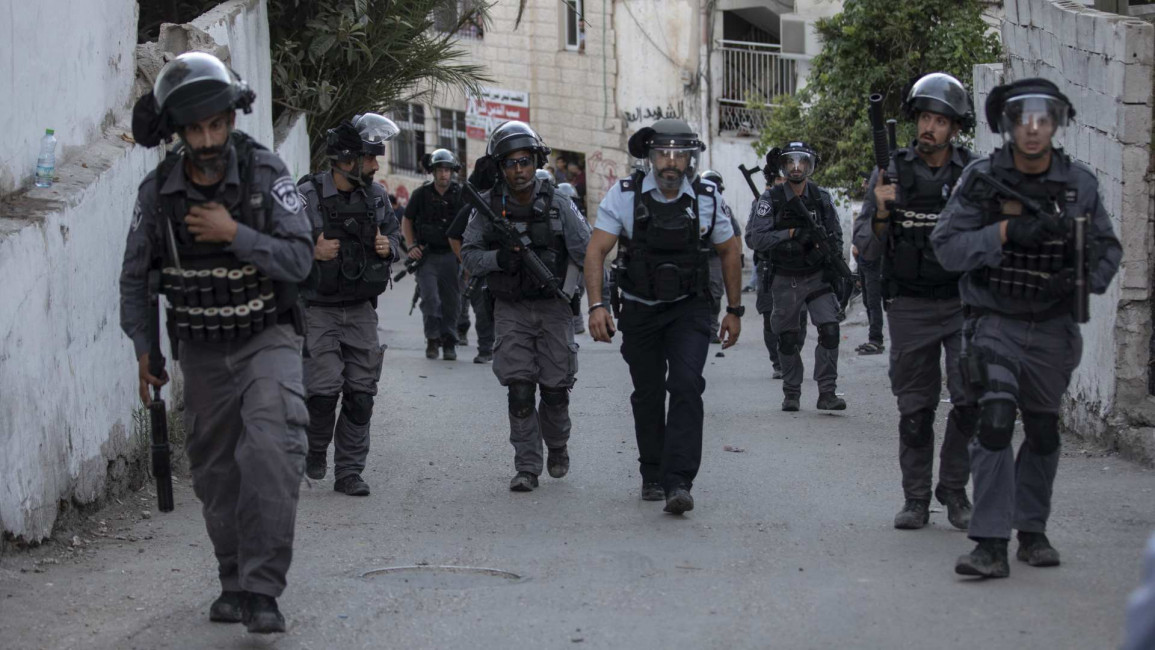Follow us on Facebook, Twitter and Instagram to stay connected
Israeli forces ignore coronavirus distancing measures, continue campaign of arrests against Palestinians
Palestinian residents of Issawiya told Haaretz that arrests were being carried out with no protective gear and that security forces were not abiding by social distancing orders.
Israel's government approved a series of measures Friday last week to reduce the movement of citizens and combat the outbreak of the virus.
As it stands, Israelis are only able to leave the house to go to work, to buy food and medicine, receive medical care, donate blood, protest, and attend court hearings and religious ceremonies.
Despite the restrictions, violent clashes erupted in East Jerusalem's Issawiya neighbourhood on Wednesday and Thursday nights.
Residents said Israeli forces secured an ambulance taking people in the neighbourhood who had returned from abroad for coronavirus testing on Wednesday.
Officers also entered the neighbourhood to arrest a man "suspected of performing sanitation work on behalf of the Palestinian Authority," Haaretz reported, an act prohibited by Israeli police.
"No one touched them, no one said anything," local activist Mohammed Abu Hummus told Haaretz.
"After several hours the police officers returned and started going around the neighbourhood. They detained two kids who were just standing there."
|
"They travel with seven or eight people in the same car and stand close together, maybe even 15 (officers) in a square meter, as if there’s no emergency," he told Haaretz.
It is "astonishing that even in these days, which require unique conduct to contain the coronavirus, the police's aggressive activities in the neighbourhood go on as usual," Attorney Oshrat Maimon of NGO Ir Amim said, in a letter addressed to Israel's Health Minister Yaakov Litzman and Jerusalem's Mayor Moshe Leon.
Israel Police, in comments shared by Haaretz, said it "operates throughout Jerusalem to ensure public safety and security… including in the village of Iswaiyah, which for years has been a focal point of riots".
"Alongside this activity, these days Israel Police is also working to enforce the Health Ministry's decrees… in order to prevent gatherings and the opening of businesses ordered to shut down, with the aim of preventing the spread of the coronavirus in Israel," it added.
Opponents of Prime Minister Benjamin Netanyahu have voiced concern that the PM is undermining Israel's democratic foundations in recent days in a desperate bid to cement his grip on power.Netanyahu and his surrogates have shut down the court system, approved the use of sophisticated phone-surveillance technology on the general public and temporarily suspended the activities of parliament.
Nearly every evening, Netanyahu gives a televised address, sternly telling the nation that he is imposing tough new restrictions to prevent the spread of the virus. He has ordered people to stay indoors, ordered tens of thousands of people into home quarantine and virtually sealed its borders.
In Thursday's address, he said he was further tightening restrictions on movement, with exceptions only to go out for food or other urgent matters. "You must stay home. It's no longer a request," he said.
Read more: Coronavirus shows how Israel is in charge of life and death in Gaza
Issawiya neighbourhood, which is a regular target of Israeli security operations, has been a hotbed of tensions in recent months, with clashes often breaking out between Palestinian protestors and Israeli forces.
Israel occupied East Jerusalem and the West Bank in the 1967 Six-Day War. It later annexed east Jerusalem in a move never recognised by the international community.
Israel sees all of Jerusalem as its undivided capital, while the Palestinians see east Jerusalem as the capital of their future state.

Agencies contributed to this report.



